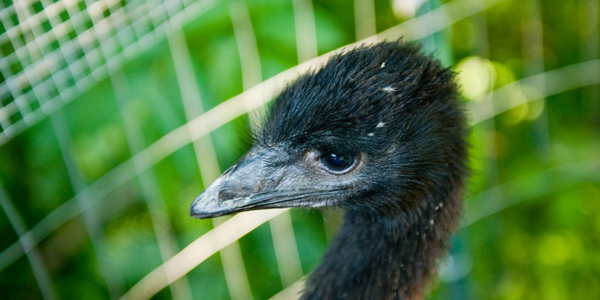
Some people come away from the Minnesota State Fair with fresh ideas about canning, cooking, or butter sculpting, but Tom and Mary Lakner might be the only people who’ve ever left the fairgrounds thinking, “Let’s start an emu farm.”
Just before getting married 14 years ago, the pair saw the ostrich-type birds at the fair, and chatted with a farmer there about the varied uses of emus. Not only is the meat healthy — leaner than turkey, and 97 percent fat-free — but the birds also provide a source of oil that’s anti-inflammatory and deeply moisturizing.

The more the Lakners heard, the better it sounded, and less than a year later, they were caring for a breeding pair at their little ranch in Forest Lake, after obtaining the birds from another Minnesota ranch that’s since closed.
They connected with other emu ranchers across the state and the country, and read as much as they could on the topic; mainly, everyone swapped stories about their mistakes, and Tom and Mary listened. Many ranches closed because they invested too much in elaborate, automated watering systems or large enclosures, so the Lakners kept is simple and used what they had instead.
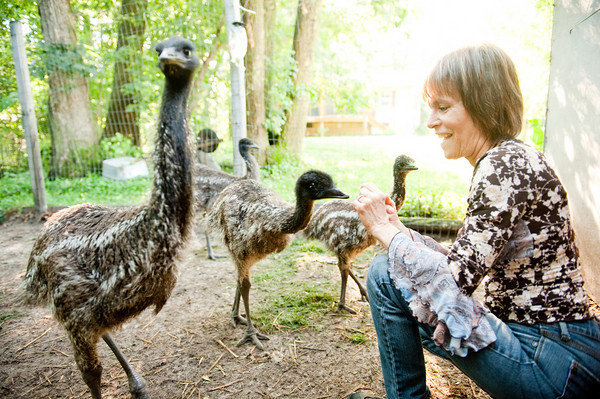
They named the place Hassu Lintu, which means “crazy bird” in Finnish; the term stuck after the couple discovered that younger birds would do a kooky kind of dance if they whistled. When the birds get older, the female uses her hollow chest cavity to produce an amazing drumming sound that must make a good accompaniment to all that teenage-emu dancing.
Crazy Birds
As they walk through the spacious outdoor pens, Tom and Mary coo to the birds, from the tiny, frantic three-week-old who’s just been put outside for the first time, to the incredibly curious three-month-olds that love to try and bite gently at Mary’s rings. They tug at her like kids wanting attention, and she’s happy to oblige. “They’re like cats, in many ways,” she says, with obvious affection. “They either really warm up to you, or they’re a bit standoffish.”
These smaller ones aren’t aloof in the least, swarming around her as she pets them. “They really can be so sweet.” As if to prove her point, one of the females in their three adult breeding pairs snuggles into her after she enters that pair’s pen. Although the bird is taller than Mary, she’s more than willing to drape her long neck against the rancher’s shoulder and let her beak hang over, drumming happily as Mary smooths the coarse feathers.
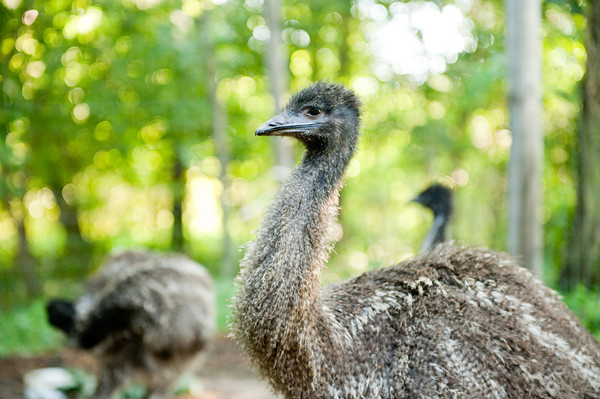
The cuddling is nice comfort during a tough season; recently, the ranch had a “bad hatch,” with very few eggs yielding emus. Usually, the eggs can result in up to 40 new emus, and during one of the ranch’s first years, there were so many that Mary describes them being all over the house in the winter. “We had babies in the bathtub,” she says, with a laugh. “You couldn’t go anywhere inside without finding a baby emu.”
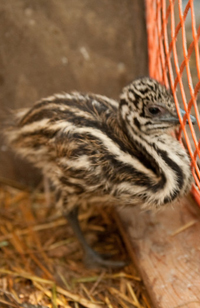
Through their associations with other emu farmers, the couple hope to get about 25 birds from Texas soon, and are crossing their fingers for a good hatch next year — emus lay their eggs around December since they’re on Australian time, where the seasons are opposite to ours. Until then, the Lakners will depend more on their professional jobs, with Mary’s psychology practice and Tom’s work in special education, and care for the birds they do have now.
“It doesn’t matter how long you do this, there will always be tough years,” says Tom. “Like any farmer, you just work through it.”
Local and Free Range
The main “crop” for the Lakners is emu oil, which is used for its anti-inflammatory properties and skin-softening qualities, and is obtained when the birds are processed (the rancher term for “sent to the butcher”). The oil is transdermic, meaning it can penetrate the skin more easily, and when combined with other elements — like aloe vera, for instance — it can boost the power of those ingredients.
The meat, too, provides a small income for the ranch, and the Lakners use Deutschland Meats in Lindstrom, a place that specializes in non-traditional animals like bison, deer, and small game. The birds are sent there at about 15 months old — although breeding birds, who can live for nearly 30 years, don’t make the journey — and the number of birds per year varies widely. One year, the ranchers sent nearly 40 to be processed, but in leaner years, it can be only two or three. They generally aim for about 20.
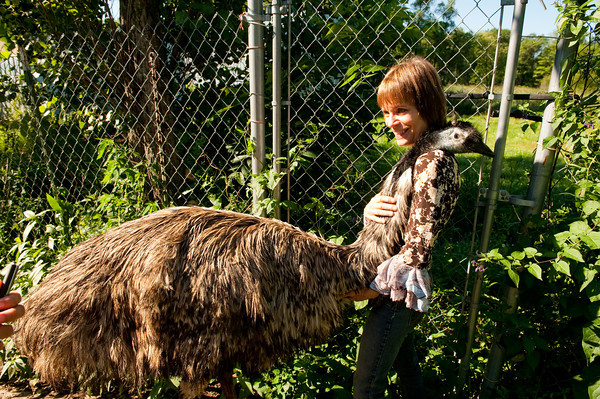
Although emus are birds, their meat is nothing like poultry. Instead, it’s closer to beef or bison in taste and texture.
Often, Mary and Tom will cook up emu burgers in the summer and treat themselves to emu steaks once and a while. A chef at Bayport Cookery once bought a sizable quantity from them and created a dish of emu and blueberry, and now Mary cooks that for visitors, too.

Because the birds are small and yield a very limited amount of meat — only two steaks per bird — prices tend to raise eyebrows when Tom brings some to local farmers markets (for times and locations of Hassu Lintu’s farmers markets booths, check out their website).
The ground meat is $6.50 per pound, and the steaks are $14 per pound, but that’s almost a bargain, considering how they’re raised. Tom and Mary have developed vegetable pellet feed that mimics what they’d eat in the wild, and they’re careful to avoid all antibiotics and hormones.
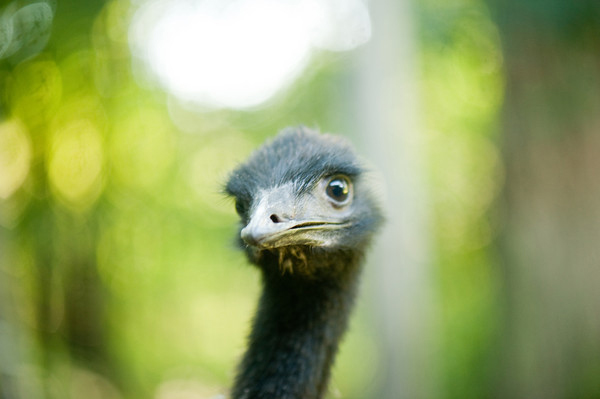
Considering that the birds can whip past you at 40 miles an hour, they can certainly qualify as free range, too.
The ranchers still laugh about the day an emu got out and, over the course of a few days, was reported in three different counties. Tom shakes his head, rolls his eyes, and confirms that the ranch is well named: “Definitely, they live up to being crazy sometimes. But they’re also a lot of fun.”
Emu products from Hassu Lintu can be bought at various local farmers markets; a calendar with times and places is available here.


Whear can you sell emus ? What are thay worth ? Whear can you buy emu feed ? Do you need to have a licence to own and raise theas birds ???
Thomas, a great place to start for your questions would be with the state association contact for the American Emu Association — you can find that info here: http://aea-emu.org/associations
Good post .. I like this very much .Welcome to the Platinum Emu Farms we are the leading exporters and manufacturers of Emu Suppliers, Emu bird’s, Emu meat,Emu chick’s suppliers.
Do sell blown out eggs by any chance?
I make jewelry boxes and music boxes out of them and searching this morning for a farm close to me to purchase these eggs at a reasonable price, I sell to family and friends, and need to keep my prices at a bare minimum with my completed product.
Do you have anyone making these products with your eggs?
I live in St. Francis and work in Wyoming, MN. Would love to show you pics of what I do with eggs.
The Eggsquisite Egg Lady
Sylvia Godich
St. Francis, MN
Was wondering if you sell Emu hatching eggs, we are needing a new 4-h project thank you!
Hello; my family had 2 emus for many years until a pack of 9 wolves stopped by ( removed by the DNR). We had them as pets and really enjoyed them. Looking to get another…or two if reasonably priced. We acquired ours for $25 a piece when very young. I don’t expect getting them for that, but if you can contact me with a price I would appreciate it. Thank you Ross.